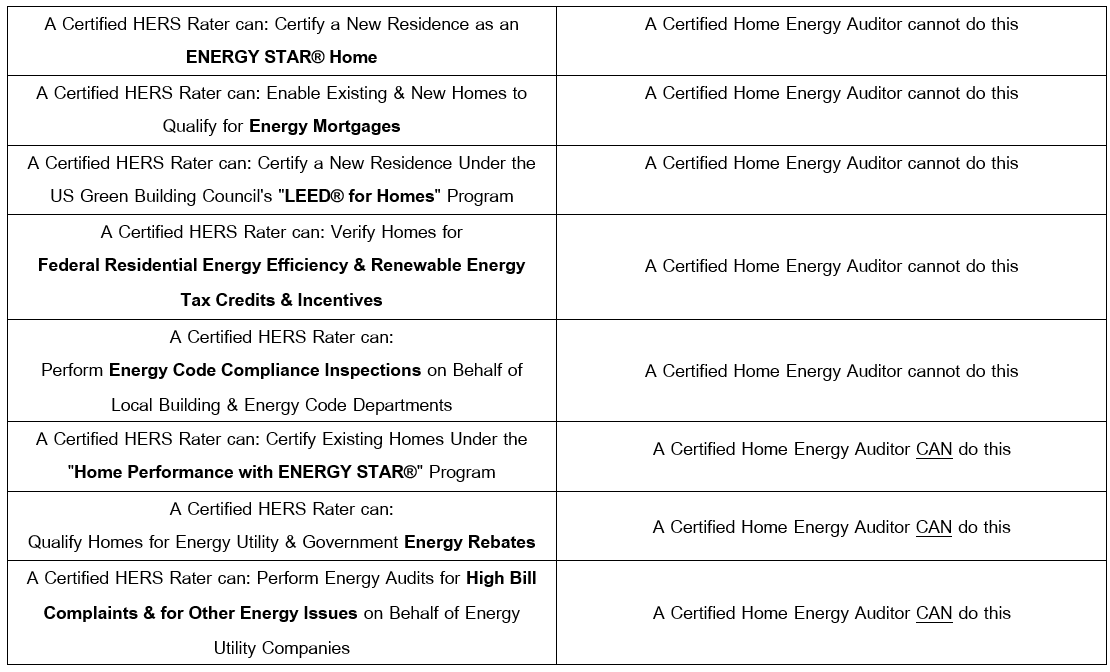There is often confusion about the difference between a residential ‘energy auditor’ and a home energy ‘Rater’ or ‘HERS Rater’. The confusion is understandable since their functions appear to be quite similar. Energy auditors and HERS Raters both evaluate energy efficiency in residential dwellings. However, HERS Raters, unlike auditors, are nationally trained and certified to provide an investment grade energy analysis, meaning their work is overseen by several levels of quality assurance. Because of this, a certified HERS Rater meets the requirements to perform analysis, verification, and energy modeling for a number of national programs. While there are certification programs for energy auditors and building analysts, there is no requirement to obtain this certification before beginning work. Anyone can claim to be an energy auditor:

HERS Raters are trained by accredited training providers and certified by accredited quality assurance providers to analyze building energy performance in both new and existing residential dwellings. They calculate the energy usage of residential buildings and determine their HERS Index Number. This process is standardized across the nation and requires the use of certified software.
Because of the level of standardization, HERS Ratings are used nation-wide to qualify homes for multiple programs and incentives. HERS Ratings are performed on existing homes, and are commonly used in new construction to qualify for programs such as ENERGY STAR, LEED for Homes, NAHB Green Build, Energy Efficiency Mortgages/Energy Improvement Mortgages, and the Federal Energy Tax Credit.
HERS Rater training includes all aspects of energy usage in a home. These include:
- Heat flow, air flow, moisture flow
- Heat load calculations
- Proper use of infiltration and duct leakage testing equipment, carbon monoxide and combustible gas testing equipment, airflow testing equipment
- Reading and working with building plans
- Creating scaled sketches
- Proper use of certified software
- Climate zones
- Construction techniques
- Alternative energy systems
- Thermal bypass and insulation installation inspections and reporting.
To achieve certification, a prospective HERS Rater must complete two simulated ratings, one simulated combustion appliance zone safety testing session, and one rigorous written exam. After training, five probationary ratings must be satisfactorily performed within one year in partnership with a Rating Quality Assurance Provider.
There are also national certification programs for Energy Auditors. The Building Performance Institute (BPI) provides one such certification, allowing a candidate to become a certified Building Analyst. BPI Building Analysts are trained and certified to perform energy audits on existing homes. They analyze the energy usage of the home and its occupants as well as evaluate the home for any health and safety issues. Energy audits are not all uniform, but are specific to the particular home and occupants being examined. There is no specific software tool required, however, there are standards that must be followed. These standards are used to ensure that no harm is done to the residence or its occupants as a result of the audit or completion of the resulting work order.
BPI Building Analyst training, despite the name, is not standardized, accredited, or overseen by BPI. It is expected to include training on all aspects of energy usage in a home, including heat flow, air flow, moisture flow, potential health and safety issues, proper use of infiltration, duct leakage, carbon monoxide and combustible gas testing equipment, understanding and interpreting BPI Standards, and writing work orders. There are several utility programs and state programs that require BPI Building Analyst Certification in order to be listed as a qualified energy auditor. To complete certification, a two-hour 100 question test must be taken, and a minimum 70% score must be achieved. (Candidates already certified as HERS Raters will take a 90-minute, 50 question test.) A field test must be taken to demonstrate equipment proficiency and appropriate use and interpretation of BPI Standards.
Energy Auditors who have not qualified for certification may or may not be trained. They may or may not use equipment and perform testing. They may or may not perform a thorough inspection of all areas of the structure to verify existing conditions. They may or may not understand and test for health and life safety issues that can be exacerbated by energy improvements such as air sealing and insulating, before recommending changes. Anyone can call themselves an energy auditor.
If you are interested in receiving a comprehensive, investment grade energy analysis of your home, or of a home you are considering purchasing, along with a prioritized list of improvements with specific information regarding health, safety, building durability, and energy savings, you are interested in a HERS Rating.